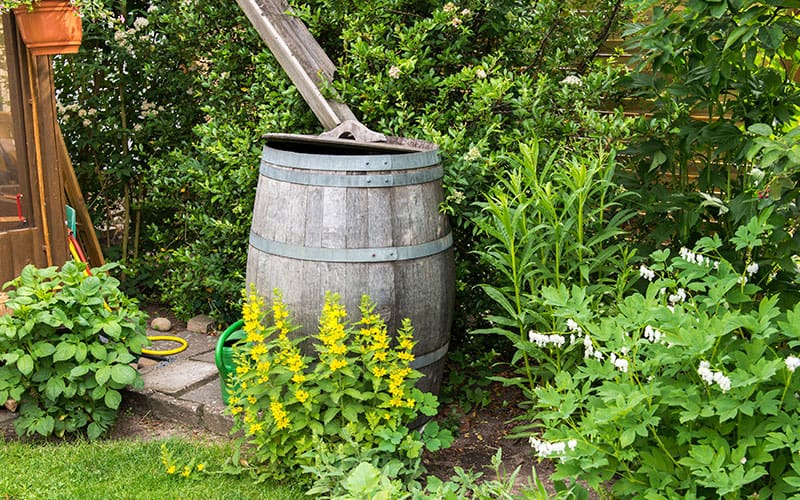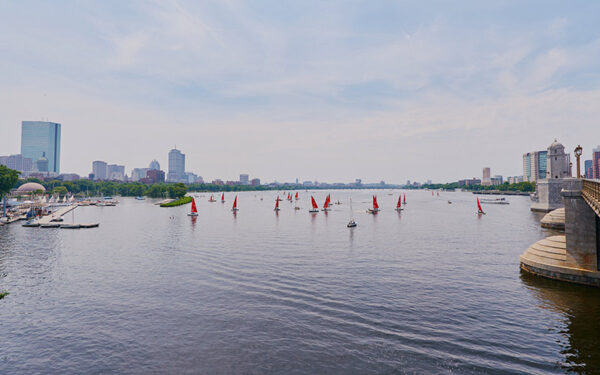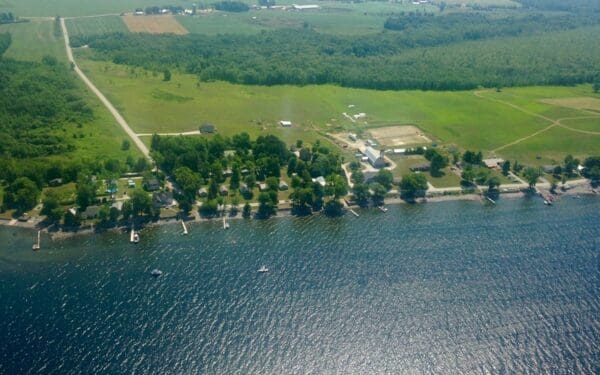
Rain barrels are an easy way to save water and protect local waterways from stormwater and nutrient pollution. Photo: Schulzie via IStock
Nutrient pollution impacts waterways across New England, from Lake Champlain to Narragansett Bay. These waters all carry excess levels of nitrogen or phosphorous – a problem caused by fertilizer running off of farms and lawns and animal waste from confined animal feeding operations. Another major cause is human sewage improperly treated by septic systems or overflowed from combined sewer stormwater treatment systems that are common in the Northeast.
All those surplus nutrients draining into our waterways cause toxic algae outbreaks, which rob the water of oxygen and make it uninhabitable for most fish, frogs, and other aquatic life. What’s more, such pollution closes beaches, clogs up ponds and lakes, destroys habitat, taints drinking water, and causes fish kills where thousands of fish go belly up at once. At its worst, nutrient pollution literally kills our bays and oceans, creating massive areas called dead zones, devoid of every living thing. Right here in New England, dead zones are already present and growing in Narragansett Bay and the Long Island Sound.
Such outbreaks are dangerous for pets and people, too, causing skin irritations, nausea, and even liver damage. Developing research is also linking exposure to blue-green algae blooms to serious neurological disorders, including Lou Gehrig’s disease and Parkinson’s disease.
While CLF is leading the legal fight to stop nutrient pollution from harming our health and our waterways, you can help, too. Here are 10 things you can do today to help protect our waters.
1. Plant a Rain Garden
Rain picks up all sorts of pollutants as it flows across your rooftop and driveway. You can help protect our rivers and streams by planting wildflowers and native vegetation around your home. These gardens soak up rainwater so pollutants are filtered through plants and soil rather than flowing directly into nearby waterways.
2. Use a Rain Barrel
Rain barrels are above-ground containers that hold rainwater. They collect the first flush of water during a storm, which is helpful because this first rainfall carries the most pollution. This water can then be released slowly into your lawn or garden, which filters the pollutants before they enter our rivers and lakes. (Rain barrels are a great way to conserve water, too.) Many communities offer rain barrels for at a discount, so be sure to check your town’s website.
3. Pick Up After Your Pet
Pet waste is a common pollutant that is often carried by rainwater into nearby rivers and streams. Not only does pet waste transmit bacteria and parasites, it is also chalk full of phosphorus, a major culprit in causing toxic blue-green algae outbreaks.
4. Build a Buffer
If you live along a lake, river, or estuary, build a buffer between your house and the water. A buffer is an area of separation between human activities and waterways where native vegetation is allowed to grow. This physical space protects waterways by filtering pollutants and preventing erosion.
5. Fertilize Properly
Phosphorus-laden fertilizers are one of the largest contributors to toxic blue-green algae outbreaks. Rainwater can easily wash away fertilizers that have been applied to lawns and gardens and on farms. Consider using organic fertilizers, which typically have lower concentrations of nutrients that are released into the environment more slowly.
6. Maintain Your Septic System
If you have a septic system, proper maintenance is a must. Failed or broken septic systems can be costly, both to you as a homeowner, and in the threat they pose to human health and the environment by releasing harmful microbes and chemicals.
7. Speak Out on Facebook and Twitter
Tell your representatives that you want strong standards that hold farmers, developers, and cities accountable. Then share these ideas for how we can all make a difference for clean water in New England.
8. Chat with a Friend
Talk with your friends, neighbors, and colleagues about nutrient pollution and share these solutions with them. Our waters may look beautiful, but that doesn’t mean they’re clean and healthy. It’s important to get the word out that we can all do our part to stop this pollution problem.
9. Realize that one person can make a difference
The average American will generate 52 tons of garbage by age 75, uses 24 barrels of oil a year, and goes through up to 2,500 gallons of fresh water a month. In zero seconds, you can understand the impact that you have on this planet and your ability to make a difference.
10. Join Conservation Law Foundation
Every day we’re fighting to protect our precious water resources. Whether in the courtroom, at the statehouse, or in the classroom, CLF advocates are creating a legacy of strong environmental standards throughout New England. But we can’t do it without you. Join Conservation Law Foundation today.



